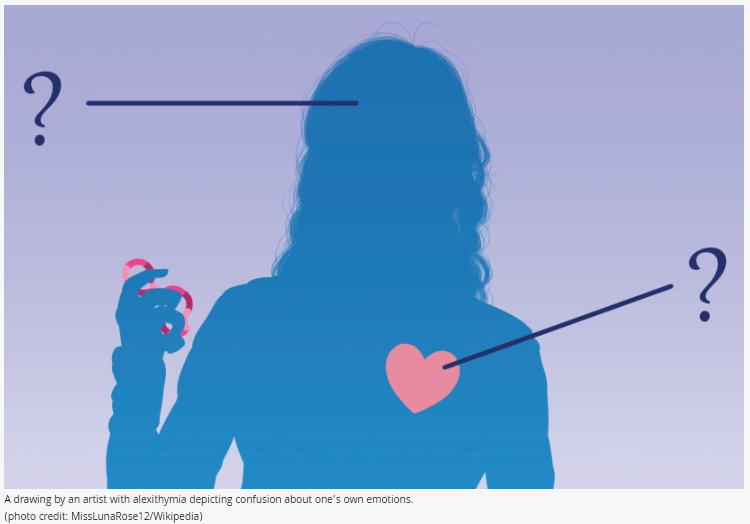Advantageous: Alexithymia has survival value. Alexithymics can be calm and composed during risky rescue operations and stay focused and functional in a crisis. They are conformists who accept social or religious views, sticking to the rules, procedures, and protocols without question. They are not self-reflective or inquisitive, nor do they search for greater depth or meaning. They are devoted soldiers, dutiful bureaucrats, obedient servants and disciples. They are never rebellious, insubordinate, or disobedient. They show veneration toward their object of awe by becoming their “clones,” mindlessly copying the gestures, dress, speech, food choices, and ideas of a rabbi or popular celebrity. They are unaffected by loss, not “burdened” by grief, anxiety or depression unless their object of awe dies. Then they are devastated and even more reverential.
How to identify alexithymia
- Lacking empathy: Real love requires empathy, which is the ability to imagine yourself in another person’s shoes. This is called “theory of mind.” Because alexithymics lack imagination, they can’t grasp the impact of their behavior on others. They have no need to share feelings, but may want to talk about concrete facts, such as “What’s for dinner?” “What is the interest rate?” “Is it kosher?” If asked about an illness, they’ll reply, “I’m fine.” How was the concert? “Great!” No details. Trying to extract more information just creates frustration and resentment on both sides. Therapy and date nights won’t help, unless conversations are restricted to concrete facts. Feelings don’t matter.
- Restricted: Alexithymics do feel emotions, but within a very limited bandwidth. They know if they feel comfort or discomfort, boredom or pleasure. If they see blood, they might know something happened, since the blood is real and a sign of injury. But this does not activate any emotions, only a desire to fix the situation.
Avi: “Before my second marriage, my wife told me she was 56 years old. But when we went on vacation, I saw that her passport said she was 66, like me. When I confronted her, she showed no shame or remorse and just replied, ‘You should have known that all women lie about their age.’ There was no empathy for how her deception affected me.”
- Literal: Alexithymics are very literal and fail to grasp metaphors. A man said, “I told my wife that her incessant criticism was like being bitten by a dog throughout the day.” She replied, ‘So, you’re calling me a dog?’”
- Extroverted: They have an extroverted, concrete cognitive style, with no interest in introspection or self-reflection. They focus on concrete facts, like the newest car models, politics, finances, or halachic details such as proper hand-washing or bug checking. Their dreams are also concrete, not creative. If someone asks, “What are you thinking about during these long silences?” the reply is likely to be, “Nothing,” or “I have to check the tires,” “I have to make the insurance payments,” or “I’m thinking about the color scheme and menu for the next simcha.”
- No imagination: Alexithymics lack imagination. In order to empathize, one must be able to imagine oneself in the other person’s shoes, which alexithymics cannot do. This makes them appear very reliable and stable, albeit lacking spontaneity. They obediently conform to the rules, trends, and demands. Their goals are quite mundane: finish today’s daf, eat a good meal, fold laundry, and pay the bills. They are not innovative or creative and feel no need to express individuality. They succeed in occupations where order, structure, and predictability are prized, such as accounting or computer programming.
- Mind blind: MRI scans show that the brain of an alexithymic does register feelings, but the alexithymic is disconnected from them. It’s a kind of “heart blindness.” If they get irritated or angry, they cannot elaborate on it and say, “I feel disappointed, rejected, or threatened.” If people probe and ask the reason for their anger, they get even angrier, as they do not understand what is being asked of them. If someone expresses antagonism toward them, they may view their antipathy as a sign of interest and push aggressively to win the approval of the person who is rejecting them. For example, “You want a divorce? That shows how much you care! I just have to try harder to win you over.”
- Somatization: They confuse bodily sensations with emotions. For example, “My head hurts, so that means I’m bored.” Or “My heart is racing; that means I must be in love.” “If I’m at a funeral and my eyes are filled with tears, this means it’s windy or I might have a blocked tear duct.”
- Parenting by rules: Because alexithymics tend to be unaffectionate, they often seek parenting mentors who tell them to avoid “pampering” children by hugging them and not to soothe them when they are in distress. These mentors demand obedience to their rules, like “A child’s refusal to obey is a sign of disobedience and disrespect and must be met with a slap, time-out, or punishment.” Mothers are encouraged to return to work soon after birth to make children independent. Meals are on the table and laundry is folded, but there are no heart-to-heart talks, no interest in their children’s inner world, and no creative interventions with children. Instead, to them “anger is education” and “respect equals obedience.”
L: “My wife is very practical. She works up to the moment she gives birth and goes back to work shortly after. Once, I asked her, ‘Don’t you want to spend time bonding with the baby?’ and she said that babies need to be fed and diapered, and a babysitter can do that. I have a strong need to connect and share, which she sees as a waste of time. She thinks she is a perfect mother for following the strict rules she learns from a parenting coach. She worships her with blind obedience, applying punishments regardless of a child’s age, personality, or distress. She justifies being harsh by saying that I’m the soft, permissive one and has to balance me by being strict.”
- Programmed responses: Alexithymics often learn a set of stock responses to situations in which empathy is required, despite thinking that emotion is just unnecessary drama. They might mimic empathic phrases like “Aw, that must be so hard” with the correct intonation. If a person complains of being bullied, snubbed, belittled by a family member, they might say, “It’s just words. Don’t take it seriously.” You have cancer? “Hashem will heal you.” You lost your job? “You’ll soon find another one.” A child died? “It’s God’s will.” You’re still single? “You’ll soon find your zivug.” You have an abusive spouse? “Just love him more, and he’ll love you back.” A child is doing poorly academically? “He’ll be successful if you just daven hard enough.” Many will not pick up on the lack of real depth in these responses.
- Emotional starvation: Even if alexithymics have no intention to withhold, Feelers feel ignored, unloved, invisible, excluded, neglected, insulted, and infuriated. Their indifference may lead to affective deprivation disorder (ADD) in Feelers, who feel like they are trapped in a butcher’s freezer; freezing to death, unable to speak about anything other than practical matters that interest them. They see themselves as devoted parents and spouses. They may ask, “What do you want?” But they won’t take initiative. Outsiders may tell a suffering family member, “You’re crazy for not appreciating them. Your demands are unreasonable. Be happy that they don’t drink, cheat, or beat you. You’re lucky to have a spouse/parent who is so stable and rational!”
- Low E.Q. [Emotional Intelligence]: Alexithymics are often intellectually intelligent and successful in their profession. While they are not “burdened” by feelings, they may possess cognitive empathy, aware that emotions exist but are unable to tolerate them in others. They’ll say, “Just fix it or ignore it.” Or “You’re acting like a baby.” “Stop with the drama. You’re trying to manipulate me with your tears.” “Get over it already! Move on! You’re over-reacting! You’re too much to handle!” Little boys are often told, “Don’t cry! Be a man.” Most cultures encourage alexithymia by praising the stiff-upper-lip, suck-it-up approach as a sign of being a strong and self-sufficient adult. If a spouse complains of feeling rejected and lonely, advisers will often say, “S/he doesn’t seem so bad. Just be more respectful and submissive. Try harder to satisfy his/her needs.” “If he wakes you up in the middle of the night, just go back to sleep.” “Don’t let criticism bother you; it’s just words. They don’t mean it. If they complain that you’re selfish, fat, stupid and disorganized, change yourself!”
- Perfect on paper: Outsiders often see alexithymics as normal and their spouses as crazy for being so emotional and not appreciating them enough! Outsiders don’t grasp how frustrating it is to live with someone who is so limited emotionally. Alexithymics see things in concrete terms. When an eight-year-old was told “Mommy died,” he replied, “So that means I won’t get dinner tonight?” A woman was having strong contractions and told her husband to drive her to the hospital before giving birth. He said, “Can you sew the button on my suit?” Conversations focus on specific tasks, like what to buy, what to wear or serve at an event, or forms that need to be filled out. Since their own feelings are insignificant and inaccessible, other people’s feelings seem irrelevant. To a sick person, they may say, “You’ve been home from the hospital for two days already, so why can’t we host guests?”
- Logic: From the book Emotionally Dumb: An Overview of Alexithymia: “The alexithymic communication style is object-tied and logical, with a striking absence of poetic undertone which might reveal deeper resonances of psychic life.” They might discuss the dry facts of an event but without offering observations that would make the event more colorful. They don’t intentionally shut down deeper communication, they just don’t understand why people would waste time discussing them. They don’t enjoy books or movies that focus on emotions. If they do watch a movie with emotional contact, they may do so in order to learn how to mimic “normal” people. But their interactions will lack depth, sincerity, or authenticity.
- Marital intimacy: “Romance” with alexithymics can feel mechanical and awkward, done according to instructions received from a book or mentor, like “Say you love her. Bring flowers. Touch this ‘button.’ Hug for 30 seconds.” Real love requires empathy and responsiveness to a spouse’s subtle non-verbal cues that hint at their desires, not when done by rote. Without variety or spontaneity, no real heart connection develops. It’s even worse if a husband says, “I demand intimacy! It’s a wife’s obligation.” There is no satisfaction in hugging an ice cube. Meanwhile, some alexithymics avoid marriage due to the fear of being rejected for being so clueless and awkward. Others are addicted to mechanical sex, just as a physical release. This hardly feels like “lovemaking” to a spouse. Talking won’t help someone who is “allergic” to emotions and mocks any expression of feelings as unnecessary, time-wasting drama. Yet many highly emotional people marry alexithymics because they seem so calm and composed. Only afterwards do they realize how empty and stifling such a relationship will be.
- State or trait? People do not change their inborn state of being. However, people can change their traits to some extent. With “trait alexithymia,” there are no repressed feelings; the feelings don’t exist in their consciousness! Most alexithymics grew up with cold, emotionally neglectful alexithymic parents who failed to “mirror” their child. Mirroring takes place when parents label a child’s emotions and respond in kind, such as when a baby looks surprised and the mother says, “Oh! What a surprise!” Or “I see you’re sad; come, I’ll hold you.” If there is no empathic response, a child does not learn to define and express his feelings or experience how sharing them creates safe, caring connections to people. A part of the brain may never develop. However, if alexithymia developed as a protective trait in childhood to defend against abuse or neglect, they may be helped by having a warm therapist who validates their pain and expands their ability to describe their emotions. An “emotional wheel” can help. Therapy helps clients feel the anger and sadness they repressed in childhood and to feel safe expressing their feelings in the present. Learning to identify and validate their own and others’ emotions leads to greater self-compassion. Therapy will not help someone who has state alexithymia, since they see no advantage in feeling human emotions, which might include existential pain and loneliness.
Shimon: “In order to receive payment for an insurance claim, I had to appear before a medical committee and prove that I had severe damage, both physical and emotional. As they put me through various test, I felt traumatized by their cold and callous faces. They were tone-deaf to my pleas for help. It was insulting to be mocked as a baby who was trying to exploit the system.”
- Avoid therapy: Therapists are prone to promise, “Everyone can change! Anyone can choose to be anything he wants!” Billions of dollars are spent on such HOPE DOPE. Love-starved people hope that alexithymics or narcissists can be changed and provide the love they crave. In truth, you have to fall in love with yourself and find very fulfilling activities to make your life meaningful. Each of us must learn self-regulation – to acknowledge our feelings but not wallow in them. We also need to know whom to trust with our feelings and when to hide them! ■
The writer can be reached at [email protected].



